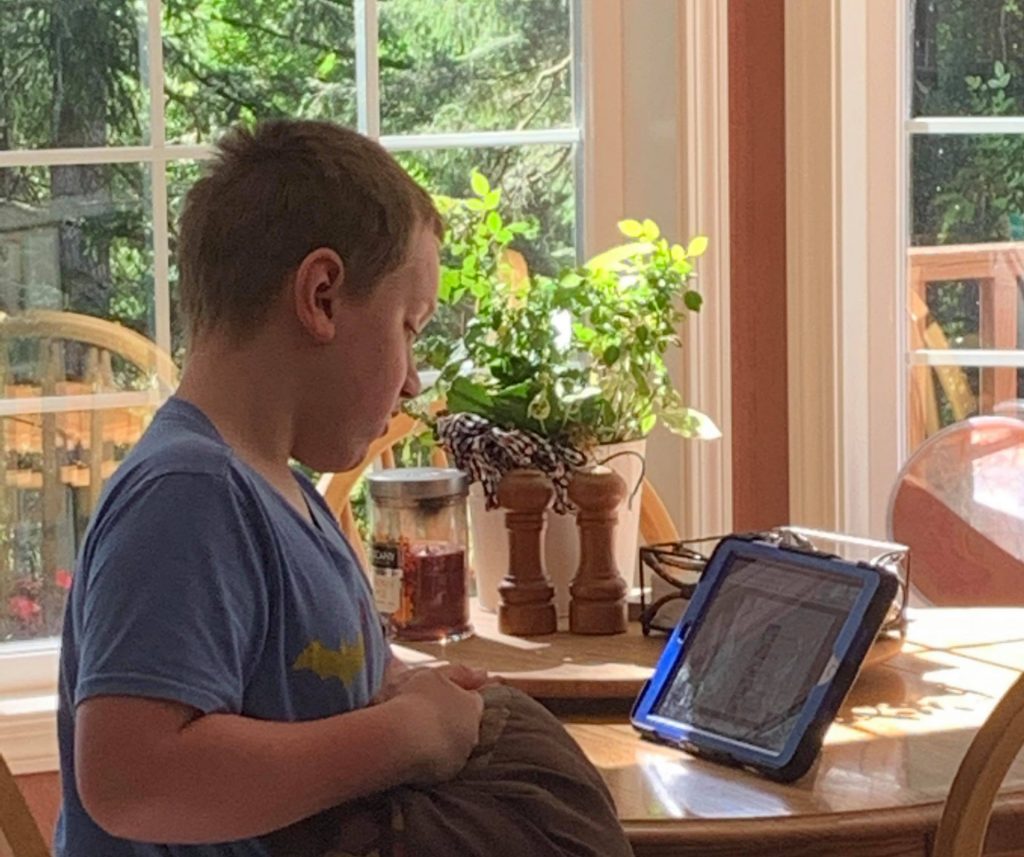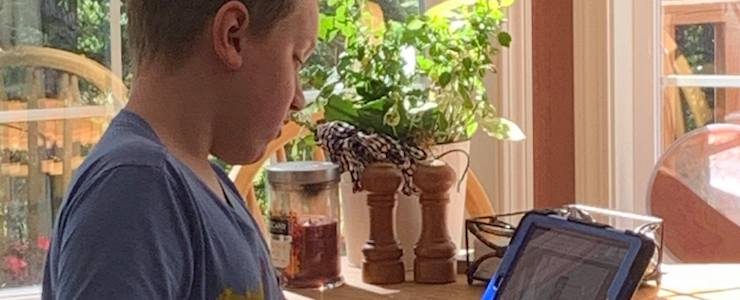
About this series:
The start of the school year is fast approaching. With no clear path forward for students who receive special education, we have invited parents to share their perspectives on the challenges they face in trying to make decisions during these incredibly difficult times. We recognize that every situation is different, and that every family is making the best choices they can. Our hope is that families can borrow ideas from each other, and that educators can also gain insight and help create solutions. If you have a story you would like to contribute for this series, please send us an email.
Distance Learning: Not an Easy Choice
by Michelle O’Dell
While our special education struggles have been real with public schools around FAPE (Free and Appropriate Public Education) for the past 7 years, nothing compares to what it’s been like these past 4 months during Covid. Schools abruptly closed March 16th, indefinitely. Spring Break eventually came and went with nowhere to go but our back yard. Facebook groups popped up with free, on-line educational resources that typically required paid memberships.
It was incredible how so many companies stepped up to help out families during the chaos, yet so overwhelming not really knowing what platform would work best for our son, Nathan. I felt grateful yet incredibly stressed, all at once.
Three weeks after Spring Break, our school district kicked out some virtual learning opportunities with emails to parents offering assignments at all grade levels via Google classroom. The saddest part for us was those assignments were for “typical learners” of the school, not Special Education students who were in a contained classroom before Covid.
Of all the years I have fiercely advocated for integration/inclusion within the Special Education community, this was one of those dark moments I felt the isolation and segregation that has forever quietly existed in our population of differently-abled students. No matter how hard I tried to keep my chin up, the reality was we were on our own to figure out a plan for Nathan’s education.
There was certainly some effort put forth to help us virtually through these uncertain times. Speech and Occupational Therapy via Zoom was being offered, and that’s when I realized something truly amazing. While in his virtual speech therapy one afternoon, I noticed how attentive Nathan was with the therapist. It donned on me how calm he was and few distractions to throw him off track. He had the comfort and safety of his home where he could be himself while working with his SLP (Speech Language Pathologist).
I later solicited the help of a Special Education teacher from King County who offered to tutor Nathan via Zoom. She had all the materials needed to continue working on his current IEP goals. Never having done virtual teaching, she was a willing teacher and had the time to devote to Nathan and it helped us make that difficult decision we faced about distance learning.
I’m not going to lie, I’m struggling as a parent trying to navigate our current environment like so many others with regard to “what” and “how” school will look next year. I’m already feeling so scattered these days, and it just adds to the guilt I already carry about not being able to do enough for Nathan right now.
To alleviate some of my stress and anxiety, I had to make a decision about school sooner than later. My husband and I weighed the pros and cons before making the decision for our family to enroll in a virtual school.
Making a decision, and not waiting for schools to make the decision for us, made the most sense right now. Reading how schools districts are more worried about potential lawsuits, and requesting Federal protections instead of focusing on how to best serve our kids, helped solidify our decision.
Worrying about FAPE right now isn’t in my radar. We are at war with a virus. It is my feeling that we parents have a duty to serve in this war alongside those who teach our kids and whom might also have children of their own to protect. It’s going to take a village to create educational supports close to what our kids were used to receiving, not fight over what it might not be.
We will all get through this, together.
About Michelle O’Dell
Michelle is Informing Families Coordinator for Thurston, Mason and Pierce Counties and serves on the board for the Fragile X Association of Washington State. As a parent who understands the challenges of navigating complex systems, she is passionate about making sure other families get the information and help they need.
Related Articles
Where There is a Will, There Must be a Way, by Adrienne Stuart
Resources
Advocacy & Support
Arc Chapters
PAVE
Parent to Parent
Office of Education Ombuds
Washington Autism Alliance and Advocacy
Education Guidelines
Office of Superintendent of Public Instruction
Summary of Reopening Washington Schools 2020: Special Education Guidance
Legal
Northwest Justice Special Education Clinic
Technology and Communications
Internet and phone resources. Locate free cell phones, low cost internet service, and other assistive technology resources.
Telecommunication Equipment Distribution (TED) Program. Devices and apps for anyone who lives in Washington State (over age 4) and who is deaf, hard of hearing, deaf-blind, or has difficulty with speech.
Other Resources
Office of Education Ombuds: Back to School Planning for Remote Education





